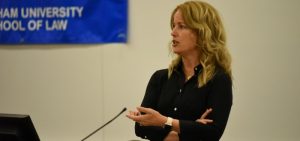With more than 50 cases on the docket, including blockbuster cases involving everything from Deferred Action for Childhood Arrivals (DACA) to New Jersey’s “Bridgegate” scandal, the 2019-2020 U.S. Supreme Court Term promises to be significant. On Nov. 20, Fordham Law School faculty members presented their predictions in a panel titled, “Highlights of the Upcoming Supreme Court Term.” The event was organized by Leonard F. Manning Professor of Law Abner Greene and was co-sponsored by Fordham Law’s American Constitution Society and Federalist Society student chapters.
Title VII
Professor Tracy Higgins reviewed three separate cases, argued in October 2019, dealing with Title VII of the Civil Rights Act of 1964. She argued that the forthcoming decisions in these cases will have important consequences for civil rights issues.
In Bostock v. Clayton County and Altitude Express v. Zarda, the plaintiffs claimed that they were fired from their jobs due to their sexual orientation. At issue is whether Title VII protects individuals against discrimination based on one’s sexual orientation. In R.G. & G.R. Harris Funeral Homes Inc. v. Equal Employment Opportunity Commission, the plaintiff argued that she was fired from her job on the basis of her transgender or transitioning status.
“Another important argument here is that, when these cases actually get litigated, a lot of the evidence speaks to the question of stereotyping,” Higgins said. “There’s the question of whether a person’s performance on the job or way of presenting oneself conforms to expectations about masculinity and femininity.”
Higgins argued that Associate Justice Neil M. Gorsuch will be the swing vote in these pending cases. Professor Greene posited that the Supreme Court will likely decide against the plaintiffs in the Bostock and Zarda cases. “They can plausibly say that as a matter between sex and sexual orientation…they’re often thought of as different things in our lives,” Greene said. “But I do agree that the [R.G. & G.R. Harris Funeral Homes] case is very hard to decide against the plaintiff. I think that’s clearly discrimination based on sex.”
Defrauding the Government of its Property
The Supreme Court will weigh in on the infamous “Bridgegate” scandal when it hears oral arguments in Kelly v. United States on Jan. 14, 2020. Former Deputy Executive Director at Port Authority of New York and New Jersey William Baroni, Jr. and former Deputy Chief of Staff for then-New Jersey Governor Chris Christie Bridget Kelly were convicted of scheming to create major traffic delays on the George Washington Bridge. A fictional traffic study was concocted as a cover story in order to punish Fort Lee’s then-Mayor Mark Sokolich, who didn’t endorse Christie in his reelection. In the end, taxpayers paid more than $15 million for Christie’s legal response to the scandal.
“It comes at a very interesting time because the fundamental question in this case is what is the normal ‘rough and tumble of politics’ and what is illegal corrupt behavior?” said Zephyr Teachout, associate professor of law, of the case.
Last November, the U.S. Court of Appeals for the Third Circuit reversed the civil rights convictions, but upheld convictions for wire fraud and misuse of agency property. Next month, the defendants will appear before the nation’s highest court, continuing to argue that they didn’t take part in the political punishment scheme. They are steadfast in stating they were duped into believing the closures were for a real study.
Baroni and Kelly have also argued that they didn’t deprive residents from public property and didn’t commit fraud because Baroni had absolute authority to close the bridge’s lanes. “But if you don’t have absolute authority, you’re lying. You’re actually affecting other people’s use of public property,” Teachout said. “I can tell from the jury instructions and evidence that the jury in this case found that Baroni did not have absolute authority and, therefore, needed to lie. If he needed to lie, then this deprivation of [public]property case can stand.”
Funding for Education
Espinoza v. Montana Department of Revenue, which will be argued on Jan. 22, 2020, centers on the Establishment Clause of the First Amendment. Greene explained that Montana enacted a tax credit scholarship program in 2015 to individuals and businesses that donated to private, nonprofit organizations. The Montana Supreme Court, under the state constitution, prohibited any federal money from being designated toward religious education.
“If Montana had wanted to include religious schools or wanted to say the tax credit could go to private secular and religious schools, that would not violate the Establishment Clause under current Supreme Court doctrine. A state can have a funding program that goes to both secular and religious schools, as long as it’s sufficiently general,” Greene said. “The question then is, when a state decides it does not want to give state money for religious education, [does]that violate the Free Exercise Clause of these religious schools or parents who want to send their kids there?”
Greene predicted a 5-4 decision in favor of the plaintiffs. “If the Court holds that once you set up any kind of state funding program for private education, you must include religious education. That’ll be a big holding. Then, states or cities will have to decide whether they want to have these funding programs or not.”
DACA Policy
Professor Jed Shugerman discussed the highly anticipated DACA case—Department of Homeland Security (DHS) v. Regents of the University of California—that was argued on Nov. 12. DHS adopted DACA in 2012, under then-President Barack Obama’s administration, to postpone the deportations of undocumented immigrants who came to America as children. However, DHS began to phase out DACA two years ago.
“When the Obama administration wheeled out this proposal, they framed it in a very particular way, strategically and legally. The title of the [announcement]speech was ‘Exercising Prosecutorial Discretion With Respect to Individuals Who Came to the United States as Children,’” Shugerman said. “Both the Obama administration and the Trump administration were operating in bad faith, legally, to make arguments [and]decide when [quasi-legislative rule or prosecutorial discretion] is convenient.”
The plaintiffs argued that when the Trump administration gave constitutional and statutory reasons for rescinding DACA, those reasons triggered concerns that the decision was arbitrary and capricious. They also said this phase-out violated the Administrative Procedure Act (APA) and the Equal Protection Clause and didn’t comply with the APA’s notice-and-comment requirements. The plaintiffs felt DACA should’ve been treated as an administrative rule.
Shugerman predicted the Court will uphold the Trump administration’s decision to rescind DACA. Although he thinks it’s morally imperative to protect the Dreamers, this decision would be the right result under the law. Teachout agreed that this argument for prosecutorial discretion is “incredibly strong.”







